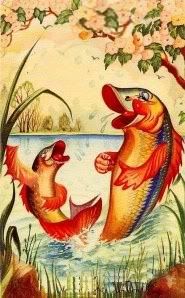 |
This used to be a day to be careful. Small pranks (some actually larger for the receiver than the giver) were expected all day, mostly from friends and family, but also from strangers. It was a fun and festive day, in its own right. Yet, it has diminished in importance.
Partly, I think this is because it doesn't have the commercial clout of a holiday like Halloween. Partly it is because its religious and Christian origins have been forgotten (unlike Halloween, which still retains some of its Christian and religious significance). Who cares about fish, and what amount of money can be made from cheap fish-shaped candies, and paper cut-outs sold to lazy people who cannot make their own "April Fool's Day" cardboard fish?
Yet, Jesus fed the multitude with a couple of lowly fish.
The fish was an important symbol (and sign) in early Christian history. Below is information on how the early Christians recognized each other through Ichthys:
According to tradition, ancient Christians, during their persecution by the Roman Empire in the first few centuries after Christ, used the fish symbol to mark meeting places and tombs, or to distinguish friends from foes...Jesus' fishermen disciples were preceded in various Old Testament stories:...when a Christian met a stranger in the road, the Christian sometimes drew one arc of the simple fish outline in the dirt. If the stranger drew the other arc, both believers knew they were in good company. Current bumper-sticker and business-card uses of the fish hearken back to this practice. The symbol is still used today to show that the bearer is a practicing Christian. [Christianity Today, Elesha Coffman, "Ask the Editors" October 26, 2001 - Ask the Editors - Christian History].
Jeremiah 16:16:And their analogous stories in the New Testament:
Behold, I am sending for many fishers, says the Lord, and they shall catch them.
Ezekiel 49:10:
Fishermen will stand beside the sea; from En-gedi to En-eglaim it will be a place for the spreading of nets; its fish will be of very many kinds, like the fish of the Great Sea.
John 21:11:These fishermen were also "fishers of men" or saviors of men:
So Simon Peter went aboard and hauled the net ashore, full of large fish, a hundred and fifty-three of them; and although there were so many, the net was not torn.
Jeramiah 16:14-16:
"Therefore, behold, the days are coming, says the Lord, when it shall no longer be said, 'As the Lord lives who brought up the people of Israel out of the land of Egypt,' but 'As the Lord lives who brought up the people of Israel out of the north country and out of all the countries where he had driven them.' For I will bring them back to their own land which I gave to their fathers."
Luke 5:7-11:Fish are also used in many Biblical stories, Old and New Testament, from the giant fish which housed and saved Jonah, to Jesus comparing his disciples to fishermen. They are also recommended as food, which includes instructions on how to clean them and make them edible:
After bringing the boats back to the shore, Peter, Andrew, James, and John responded to the call to follow Jesus.
Fish were a favorite food and a chief source of protein (Numbers 11:5; Nehemiah 13:16). The law regarded all fish with fins and scales as clean. Water animals that did not have fins and scales were unclean (Leviticus 11:9-12)...
Fish provided food for the common people (Matthew 14:17; Matthew 15:34). The risen Lord ate fish with the disciples in Jerusalem (Luke 24:42) and by the Sea of Galilee (John 21:13). The primary method of preparing fish was broiling (John 21:9). The most famous New Testament fish was the one used to pay the Temple tax for Jesus and Peter (Matthew 17:27).
[Source]